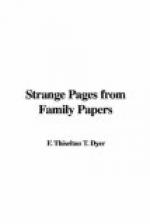CHAPTER VII.
CURIOUS SECRETS.
“And now I will unclasp
a secret book,
And to your quick-conceiving
discontent
I’ll read your matter
deep and dangerous.”
1.
HENRY IV., Act 1., sc. 3.
“The Depository of the Secrets of all the World” was the inscription over one of the brazen portals of Fakreddin’s valley, reminding us of what Ossian said to Oscar, when he resigned to him the command of the morrow’s battle, “Be thine the secret hill to-night,” referring to the Gaelic custom of the commander of an army retiring to a secret hill the night before a battle to hold communion with the ghosts of departed heroes. But, as it has been often remarked of secrets—both political and social—they are only too frequently made to be revealed, a truth illustrative of Ben Jonson’s words in “The Case is Unaltered “—
A
secret in his mouth
Is like a wild bird put into
a cage,
Whose door no sooner opens
but ’tis out.
In family history, some of the strangest secrets have related to concealment of birth, many a fraud having been devised to alter or perpetuate the line of issue. Early in the present century, a romantic story which was the subject of conversation in the circles both of London and Paris, related to Lady Newborough, who had always considered herself the daughter of Lorenzo Chiappini, formerly gaoler of Modigliana, and subsequently constable at Florence, and of his wife Vincenzia Diligenti. Possessed in her girlhood of fascinating appearance and charming manners, she came out as a ballet dancer at the principal opera at Florence, and one night she so impressed Lord Newborough that, by means of a golden bribe, he had her transferred from the stage to his residence. His conduct towards her was tender and affectionate, and, in spite of the disparity of years, he afterwards married her, introducing her to the London world as Lady Newborough.
Some time after her marriage, according to a memoir stated to be written by the fair claimant of the House of Orleans, and printed in Paris before the Revolution of 1830 but immediately suppressed, when staying at Sienna she received a posthumous letter from her supposed father, which, from its extraordinary disclosures, threw her into complete bewilderment.[31] It ran as follows:
MY LADY,—I have at length reached
the term of my days without
having revealed to anyone a secret which
directly concerns me and
yourself. The secret is this:




